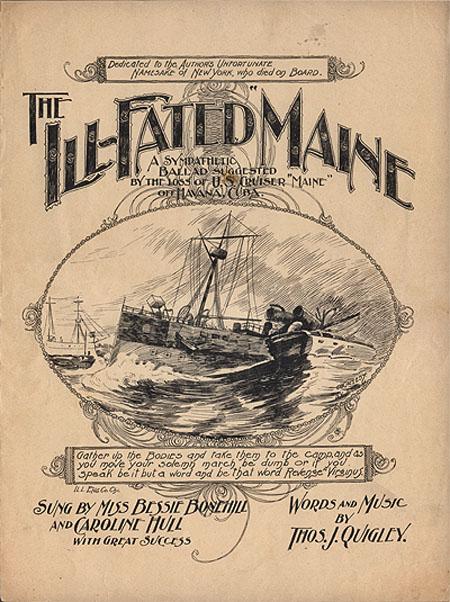
There were several songs about the sinking of the ill fated Maine in Havana harbor in 1898. There may not be much interest in the ill fated battleship
McCain. Further investigations will be made to determine if his sinking was due to external causes or self destruction. Now is the time for editorializing and rallying the troops. Therefore, it falls on me to try a little song re-writing.
The original can be found
here.
Lend your ear to the whisper, it floats from afar,
It has traveled from where, underneath her lone star,
The fair isle of Cuba impatiently waits
The summons to enter our circle of states.
From the depths of her anguish the throes of her pain,
That whisper comes to us, "Remember the 'Maine'."
Lend your ear to the whisper, it tells of the brave,
Who with sword yet in sheath, know not even a grave;
Can we say had that sword but been wakened in time,
That back from the shot-riven air and the grime
Of the conflict, our sons might have reached us again,
While their foemen would ever "Remember the 'Maine'."
Lend your ear to the whisper, nay lend more your hand,
'Twill be needed, if men yet remain in this land,
That so proudly lays claim to the title of free,
And that now in its sorrow is summoned to be
A saviour, if not an avenger; how plain
Comes the message, O brothers "Remember the 'Maine'."
Lend your ear to the whisper, 'tis growing more strong,
'Tis a whisper no longer, 'tis sweeping along
Through the length and the breadth of this land of the free,
From city to mountain, from mountain to sea,
And the voice of America tells thee, O Spain,
That the men of our country "Remember the 'Maine'."
-Arthur H. MacOwen 1898
My adaptation follows,
He had traveled from where, underneath her
lone star,
The fair state of Zona impatiently wants
The summons to enter our circle of Presidents.
From the depths of her anguish the throes of her pain,
That whisper comes to us, "Remember the 'McCain'."
Lend your ear to the whisper, it tells of the brave,
Who with votes not yet cast, knew of their grave;
Can we say had those voters but been wakened in time,
That back from the stumps and the grime
Of the campaign, our son might have reached us again,
While their foemen would ever "Remember the 'McCain'."
Lend your ear to the whisper, nay lend more your hand,
'Twill be needed, if men yet remain in this land,
That so proudly lays claim to the title of free,
And that now in its sorrow is summoned to be
A saviour, if not an avenger; how plain
Comes the message, O brothers "Remember the 'McCain'."
Lend your ear to the whisper, 'tis growing more strong,
'Tis a whisper no longer, 'tis sweeping along
Through the length and the breadth of this land of the free,
From city to mountain, from mountain to sea,
And the voice of America tells thee, O. Hussein,
That the men of our country "Remember the 'McCain'."
-Wallace H. Hartley
(Note that no changes were needed to the third verse)
















